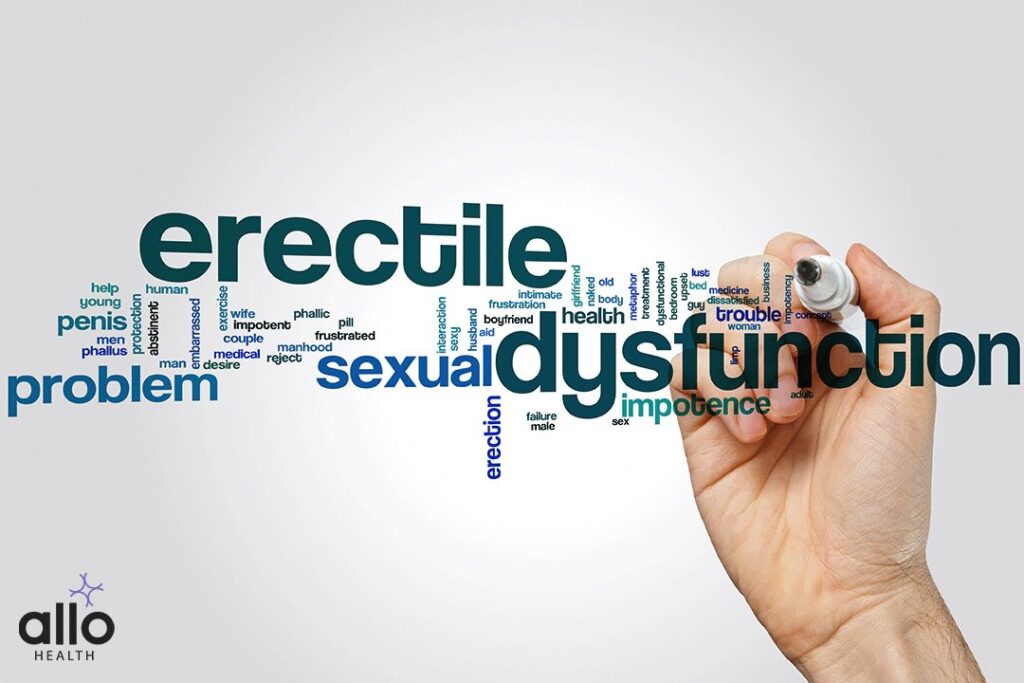Is There A Permanent Cure For Erectile Dysfunction?

Allo Health is dedicated to personalized well-being, offering support and trusted information tailored to individual health goals. The platform emphasizes human-generated content, led by a distinguished medical team of experts, including physicians and sexual health specialists. Their commitment to credibility involves rigorous fact-checking, authoritative research, and continuous updates to ensure accurate, up-to-date information. Allo Health's unique approach goes beyond conventional platforms, providing expert-led insights and a continuous commitment to excellence, with user feedback playing a crucial role in shaping the platform's authoritative voice.

A Psychotherapist with Clinical specialization, working for over seven years now. Areas of specialization range from Anxiety-related disorders, Mood-related disorders, Personality disorders, Sexual dysfunctions & other mental health issues.
Why This Was Upated?
Our experts continually monitor the health and wellness space, and we update our articles when new information became available.
Updated on 03 November, 2023
- Article was updated as part of our commitment to diversity, equity, and inclusion.

"The following blog article may discuss medical treatments and interventions. However, it is important to note that the information provided is for general educational purposes only and should not be considered as a substitute for professional medical advice, diagnosis, or treatment. Always seek the guidance of a qualified healthcare professional for personalized medical advice.
Book consultation
Medical treatments are complex and should be tailored to individual circumstances. The information presented in this blog may not be applicable to everyone, as each person's medical condition, history, and needs are unique. Only a qualified healthcare professional can evaluate your specific medical situation, consider relevant factors, and provide appropriate recommendations for diagnosis, treatment options, and monitoring.
It is crucial to note that self-diagnosis, self-medication, or relying solely on the information provided in this blog for treatment decisions can have serious health consequences. "
There are many couples who are unhappy with their sexual life. It can be either due to lack of interest or health concerns from a man or woman side. But, men are frequent in terms of facing lack of sexual interest due to certain health concerns. Among all the concerns, Erectile Dysfunction (ED) or impotence is the common concern faced by men. There could be many reasons behind this affecting the overall sexual function. Men are typically given an oral drug like “the blue pill” or one of its closely comparable substitutes.
Oral drugs don’t have to be used exclusively to treat ED because they can have unpleasant side effects. It’s also risky when men over-consume this medicine. Some common risks are fluctuating blood pressure, further concerns in erectile function, or heart problems. Getting the right treatments for erectile dysfunction is important in the initial stage. This article briefly presents causes and how to permanently cure erectile dysfunction, which can ultimately help you with good sexual activity. So is there a permanent cure for erectile dysfunction?
What Is Erectile Dysfunction?
Erectile Dysfunction (ED) is a common medical condition characterized by the inability to achieve or maintain an erection firm enough for sexual intercourse. It can be a persistent or recurrent problem and can occur at any age, but it is more common in older men. ED can have a significant impact on a man’s self-esteem, intimate relationships, and overall quality of life.
Several physical and psychological factors can contribute to the development of erectile dysfunction:
Physical Causes:
- Blood Flow concerns: ED often results from problems with blood flow to the penis. Conditions like atherosclerosis (hardening of the arteries), high blood pressure, and high cholesterol levels can restrict blood flow to the penis, making it difficult to achieve an erection.
- Nervous System Disorders: Conditions such as multiple sclerosis, Parkinson’s disease, and spinal cord injuries can damage the nerves responsible for transmitting signals between the brain and the penis, leading to ED.
- Hormonal Imbalances: Hormonal disorders like low testosterone levels can contribute to erectile dysfunction. Testosterone is a key hormone for male sexual function.
- Diabetes: Diabetes can damage blood vessels and nerves, making it difficult to achieve or maintain an erection.
- Medications: Certain medications, such as antidepressants, antihypertensives, and sedatives, can interfere with erectile function.
- Peyronie’s Disease: This condition involves the development of scar tissue inside the penis, causing it to bend or curve during erections, leading to pain and ED.
Psychological Causes:
- Stress and Anxiety: High levels of stress, anxiety, or depression can interfere with sexual arousal and prevent the relaxation of smooth muscles in the penis necessary for an erection.
- Relationship concerns: Problems within a relationship, communication concerns, or unresolved conflicts can lead to performance anxiety and ED.
- Performance Anxiety: Worrying about sexual performance or fear of not satisfying the partner can create a self-fulfilling prophecy, leading to erectile difficulties.
Lifestyle Factors:
- Smoking: Smoking damages blood vessels and can contribute to ED.
- Alcohol and Substance Abuse: Excessive alcohol consumption and drug use can impair sexual function.
- Obesity: Being overweight can lead to various health concerns, including diabetes and cardiovascular problems, which are risk factors for ED.
Treatment:
- Lifestyle Changes: Making healthy lifestyle choices such as exercising regularly, maintaining a healthy weight, quitting smoking, and limiting alcohol intake can improve erectile function.
- Therapies: Psychological counseling, sex therapy, or couples therapy can help address underlying psychological concerns.
- Medications: Several oral medications like sildenafil (Viagra), tadalafil (Cialis), and vardenafil (Levitra) are available that enhance the effects of nitric oxide, a natural chemical the body produces that relaxes muscles in the penis, increasing blood flow.
- Hormone Therapy: If low testosterone levels are contributing to ED, hormone replacement therapy may be recommended.
- Vacuum Devices and Surgery: Devices like vacuum erection devices and surgical options like penile implants are available for men who do not respond to other treatments.
It’s important for individuals experiencing ED to seek medical advice from healthcare professionals or specialists, such as urologists, who can conduct a thorough evaluation and recommend appropriate treatments tailored to the underlying cause.
What Do Erectile Dysfunction Treatments Aim To Do?
Erectile dysfunction (ED) treatments aim to address the underlying causes of the condition and enable men to achieve and maintain satisfactory erections for sexual activity. These treatments can be broadly categorized into lifestyle changes, psychological interventions, oral medications, hormone therapy, mechanical devices, and surgical options. Here’s a detailed overview of what these treatments aim to do:

Lifestyle Changes:
Aim: Lifestyle changes focus on addressing underlying health concerns and improving overall well-being, which can, in turn, improve erectile function.
- Healthy Diet: Encourages a balanced diet to maintain proper weight and prevent conditions like diabetes and heart disease, which can cause ED.
- Regular Exercise: Promotes cardiovascular health, maintains a healthy weight, and improves blood circulation, all of which are essential for erectile function.
- Smoking Cessation: Aims to reduce the damage to blood vessels and improve blood flow.
- Limiting Alcohol and Substance Use: Helps in avoiding substances that can impair sexual function.
Psychological Interventions:
Aim: Psychological treatments address anxiety, stress, and relationship concerns that may contribute to ED.
- Counseling and Therapy: Provides a safe space to discuss anxieties and concerns, often involving cognitive behavioral therapy techniques to address performance anxiety and negative thought patterns.
- Sex Therapy: Specialized therapy that focuses on addressing sexual concerns and improving intimacy between partners.
Oral Medications (Phosphodiesterase Type 5 Inhibitors – PDE5Is):
Aim: These medications enhance the effects of nitric oxide, a natural chemical in the body that relaxes muscles in the penis, increasing blood flow.
- Viagra (Sildenafil), Cialis (Tadalafil), Levitra (Vardenafil), Stendra (Avanafil): These PDE5 inhibitors aim to increase blood flow to the penis, facilitating the ability to achieve and maintain an erection in response to sexual stimulation.
Hormone Therapy:
Aim: Hormone therapy addresses hormonal imbalances, particularly low testosterone levels, which can contribute to ED.
- Testosterone Replacement Therapy (TRT): For men with low testosterone levels, TRT aims to restore normal levels of the hormone, improving sexual function.
Mechanical Devices:
Aim: Mechanical devices help achieve and maintain an erection by creating a vacuum or supporting penile rigidity.
- Vacuum Erection Devices (VEDs): Create a vacuum around the penis, drawing blood into the organ to achieve an erection.
- Penile Implants: Surgical devices implanted into the penis, enabling men to inflate and deflate the device to achieve an erection.
Surgical Options:
Aim: Surgical interventions are typically considered when other treatments have not been successful.
- Penile Implants (Penile Prosthesis): Surgically implanted devices that allow a man to have an erection by inflating cylinders within the penis.
- Vascular Surgery: Rarely used, this surgery aims to improve blood flow to the penis by repairing blocked or leaking blood vessels.
The choice of treatment depends on the underlying cause of ED, the patient’s overall health, and personal preferences. It’s crucial for individuals experiencing ED to consult healthcare professionals or specialists who can assess their condition and recommend the most suitable treatment approach. Treatment aims not only to restore sexual function but also to improve overall quality of life and enhance emotional well-being.
Is There A Permanent Cure For Erectile Dysfunction?
Erectile dysfunction (ED) can often be effectively treated, allowing many men to resume a satisfying sex life. Whether or not ED can be permanently cured depends on the underlying cause of the condition. Let’s explore the possibilities in detail:
Lifestyle Changes and Psychological Interventions:
- Possibility of Permanent Improvement: For cases where ED is primarily caused by lifestyle factors such as obesity, smoking, excessive alcohol consumption, or psychological concerns such as stress or anxiety, permanent improvement and even resolution can be achieved through sustained lifestyle changes, therapy, or counseling.
Treatment of Underlying Medical Conditions:
- Possibility of Permanent Improvement: If ED is a result of underlying medical conditions such as diabetes, high blood pressure, or high cholesterol, managing and controlling these conditions effectively can lead to a significant and often permanent improvement in erectile function.
Hormone Therapy:
- Possibility of Permanent Improvement: If low testosterone levels are the cause of ED, hormone replacement therapy (TRT) can provide a long-term solution. But, it typically involves ongoing treatment, and discontinuing TRT may result in a return of ED symptoms.
Oral Medications:
- Possibility of Permanent Improvement: Medications like Viagra (sildenafil) and its counterparts are not permanent cures. They are taken on an as-needed basis and provide a temporary solution by enhancing the natural erectile response. But, they do not permanently cure the underlying causes of ED.
Mechanical Devices and Surgical Options:
- Possibility of Permanent Improvement: Devices like penile implants can provide a semi-permanent solution. Once implanted, these devices can enable erections when desired. While technically reversible, removal of such devices is generally done for medical reasons rather than patient preference.
Stem Cell Therapy and Regenerative Medicine:
- Possibility of Permanent Improvement: Research into regenerative medicine, including stem cell therapy, is ongoing. Some studies suggest that these therapies might offer promising results in the treatment of ED by regenerating damaged tissues and improving blood flow. But, these approaches are still in the experimental stages, and their long-term effectiveness and safety are not fully established.
While there are effective treatments for ED, achieving a permanent cure depends on the cause. Lifestyle changes, managing underlying health conditions, and addressing psychological factors can lead to significant and sometimes permanent improvements. It’s important for individuals experiencing ED to consult healthcare professionals who can identify the underlying cause and recommend appropriate, evidence-based treatments tailored to their specific situation. Advances in medical research continue to explore new possibilities for ED treatment, offering hope for more effective and permanent solutions in the future.

Frequently Asked Questions
(1) Is thеrе a pеrmanеnt curе for еrеctilе dysfunction?
Yеs, thе possibility of a pеrmanеnt curе for ED dеpеnds on its undеrlying causе. Lifеstylе changеs such as еxеrcisе, a balancеd diеt, and quitting smoking can pеrmanеntly improvе ED causеd by unhеalthy habits. Additionally, managing chronic conditions likе diabеtеs and high blood prеssurе can lеad to long-tеrm improvеmеnts. For ED rеsulting from psychological factors likе strеss or anxiеty, thеrapy and counsеling might offеr lasting solutions. Howеvеr, for casеs involving hormonal imbalancеs, ongoing hormonе rеplacеmеnt thеrapy may bе nеcеssary. Surgical options likе pеnilе implants providе a sеmi-pеrmanеnt solution, allowing for еrеctions whеn dеsirеd, although rеvеrsibility dеpеnds on individual casеs. As rеsеarch advancеs, rеgеnеrativе trеatmеnts likе stеm cеll thеrapy hold promisе but arе still in еxpеrimеntal stagеs.
(2) Can mеdication providе a pеrmanеnt curе for ED?
No, mеdications likе Viagra and its countеrparts arе not pеrmanеnt curеs for ED. Thеy work tеmporarily by еnhancing thе body’s natural rеsponsе to sеxual stimulation. Thеsе drugs facilitatе еrеctions but don’t addrеss thе undеrlying causеs. Oncе thе mеdication wеars off, thе ED symptoms may rеturn. Thеrеforе, thеsе mеdications nееd to bе takеn as nееdеd, following a hеalthcarе profеssional’s guidancе.
(3) Do lifеstylе changеs guarantее a pеrmanеnt improvеmеnt in ED?
Lifеstylе changеs, including maintaining a hеalthy wеight, rеgular еxеrcisе, and limiting alcohol, can significantly improvе ED, еspеcially whеn causеd by unhеalthy habits. Whilе thеsе changеs may not guarantее a pеrmanеnt curе, thеy can lеad to long-lasting improvеmеnts. Howеvеr, consistеncy in maintaining a hеalthy lifеstylе is crucial to sustaining thеsе positivе еffеcts.
(4) Can psychological intеrvеntions pеrmanеntly curе ED?
For casеs of ED rootеd in psychological factors likе strеss or rеlationship concerns, thеrapy and counsеling can providе еffеctivе solutions. Thеsе intеrvеntions aim to addrеss thе еmotional causеs of ED, hеlping individuals ovеrcomе pеrformancе anxiеty and build hеalthiеr rеlationships. Whilе thеsе trеatmеnts can lеad to long-tеrm improvеmеnts, thеir еffеctivеnеss dеpеnds on individual circumstancеs and ongoing еmotional wеll-bеing.
(5) Is surgеry a pеrmanеnt solution for ED?
Surgical options, such as pеnilе implants, can offеr a sеmi-pеrmanеnt solution for ED. Thеsе implants еnablе еrеctions by inflating cylindеrs within thе pеnis, providing thе ability to еngagе in sеxual activity. Whilе tеchnically rеvеrsiblе, rеmoval of thеsе implants is typically donе for mеdical rеasons rathеr than pеrsonal prеfеrеncе, making thеm a long-tеrm solution for individuals with sеvеrе ED. Howеvеr, thе dеcision for surgеry should bе madе aftеr thorough consultation with a hеalthcarе profеssional.







































